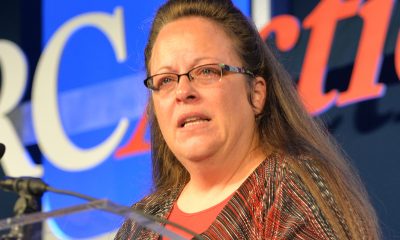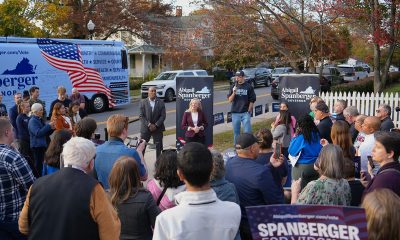Local
Activists protest ‘Kill the Gays’ bill outside Ugandan embassy
Ugandan lawmakers are expected to potentially vote on the measure before Dec. 14
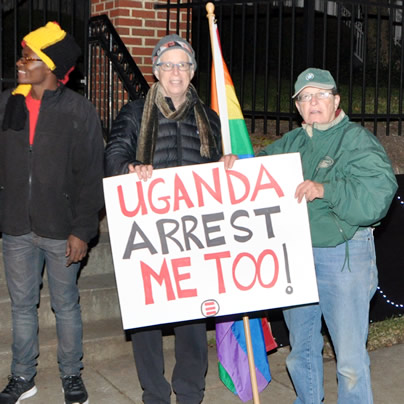
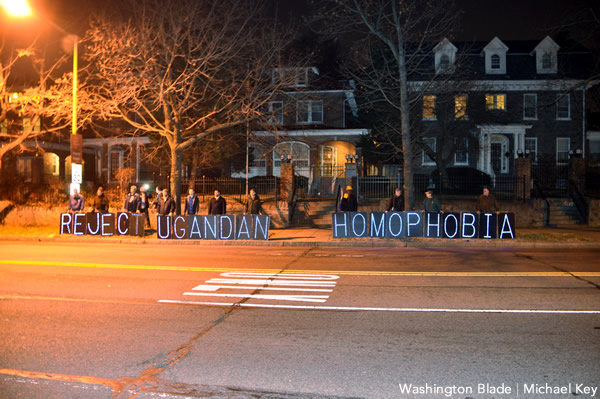
Protesters gather outside the Ugandan embassy in Northwest D.C. on Saturday to protest the country’s “Kill the Gays” bill. (Washington Blade photo by Michael Key)
More than a dozen people gathered outside the Ugandan embassy in Northwest D.C. on Saturday to protest the African country’s so-called “Kill the Gays” bill that would impose the death penalty upon anyone convicted of repeated same-sex sexual acts.
Members of the Maryland Light Brigade, which placed illuminated signs in support of last month’s referendum that upheld the state’s same-sex marriage law on interstate overpasses, organized the protest. They held lighted black panels along the sidewalk in front of the 16th Street, N.W., compound that read “Reject Ugandan Homophobia.”
Several motorists honked their horns in support of the protesters as they drove past the embassy.
“Those lawmakers are better than what they’re doing,” D.C. resident Moses Shaba, who is originally from Uganda, told the Washington Blade. “They are absolutely better than what they’re doing. I am so surprised to see that they are going on with this bill and the kind of articles and provisions that are in that bill because in the long run when this bill if it’s passed they will see their friends, their kids, their daughters, their brothers all going to jail. That’s how bad it is.”
Shaba and other protesters also sought to highlight the role they feel Scott Lively and other American evangelicals have played in exploiting homophobic attitudes in the East African country before Parliamentarian David Bahati introduced the bill in 2009. Sexual Minorities Uganda, an LGBT advocacy group, accused Lively of violating international law when he allegedly conspired with the country’s political and religious leaders to further promote these sentiments in a lawsuit it filed in a Massachusetts federal court in March.
“Normally I might say that I wouldn’t push my way into a foreign country’s internal affairs, but one of the big problems here is there’s a lot of American support for this bill,” Charles Butler said. He specifically referred to the Foundation, the group also known as the Family that organizes the annual National Prayer Breakfast, as one organization to which Bahati and other anti-gay Ugandan lawmakers and religious leaders have ties. “I just feel that it’s our responsibility to fight the Americans who are trying to export homophobia to Africa.”
Advocates expect Ugandan parliamentarians could potentially vote on the “Kill the Gays” bill before the legislative session ends on Dec. 14. The Associated Press and other media outlets have reported Bahati has removed the death penalty provision from his measure, but activists and even the U.S. State Department officials have questioned these reports.
Both President Obama and Secretary of State Hillary Clinton have spoken out against the Anti-Homosexuality Bill — they also condemned Ugandan LGBT activist David Kato’s 2011 murder. Clinton also honored SMUG Executive Director Frank Mugisha and other Ugandan human rights advocates at the U.S. Embassy in Kampala, the country’s capital, in August.
The White House and British Prime Minister David Cameron have also suggested the allocation of international aid should hinge upon a country’s record on LGBT rights.
Back in D.C., Maryland resident Deb Friedman described the “Kill the Gays” bill as “a horrific policy.”
“It’s taking the whole human community a step backwards,” she told the Blade. “I happen to be a lesbian. Even if I wasn’t I would consider it worth of protesting. Whether or not it’s going to do any good in terms of the government of Uganda and who they listen to, but I feel you have to stand out no matter what the outcome or the results are. You can’t just let it happen and not take a stand.”
Rockville resident Steve Brooks, who continues to advocate on behalf of LGBT activists in Zimbabwe in southern Africa, agreed.
“Our brothers and sisters in Africa are facing the prospect of losing their lives and their livelihoods so i’m out here to support them,” he said.
District of Columbia
Activist hosts Diwali celebration in D.C.
More than 120 people attended Joshua Patel’s party on Nov. 9.

LGBTQ activist and businessman Joshua Patel hosted a community Diwali party on Nov. 9.
Patel organized the event as a community gathering amid the Trump-Vance administration’s policies against LGBTQ inclusion and DEI. The event, held at the Capo Deli speakeasy, drew more than 120 attendees, including local business leaders.
Patel is a franchise owner of ProMD Health, recently awarded as the best med spa by the Washington Blade. He is also a major gift officer at Lambda Legal.
Patel noted that upon moving from New York to Washington in 2022, he desired a chance for community-based Diwali celebrations. He stated that the city offered minimal chances for gatherings beyond religious institutions, unless one was invited to the White House’s Diwali party.
“With our current administration, that gathering too has ended — where we cannot expect more than Kash Patel and President Trump lighting a ‘diya’ candle on Instagram while simultaneously cutting DEIB funding,” Patel said.
In addition to celebrating the festival of lights and good over evil, Patel saw the event as a moment to showcase “rich, vibrant culture” and “express gratitude.”
Patel coined the celebration a “unifier.”
“From a spiritual angle, Shiva was the world’s first transgender God, taking the form of both “male” and “female” incarnations,” Patel said. “The symbolism of our faith and concepts are universal and allows for all to rejoice in the festivities as much or little as they desire.”
Savor Soiree, DMV Mini Snacks and Capo Deli catered the event. DJ Kush spun music and Elisaz Events decorated the Diwali celebration.
The Diwali party also featured performances by former Miss Maryland Heather Young Schleicher, actor Hariqbal Basi, Patel himself and Salatin Tavakoly and Haseeb Ahsan.
Maryland
Harford school board appeals state’s book ban decision to circuit court
5-2 ruling in response to ‘Flamer’ directive
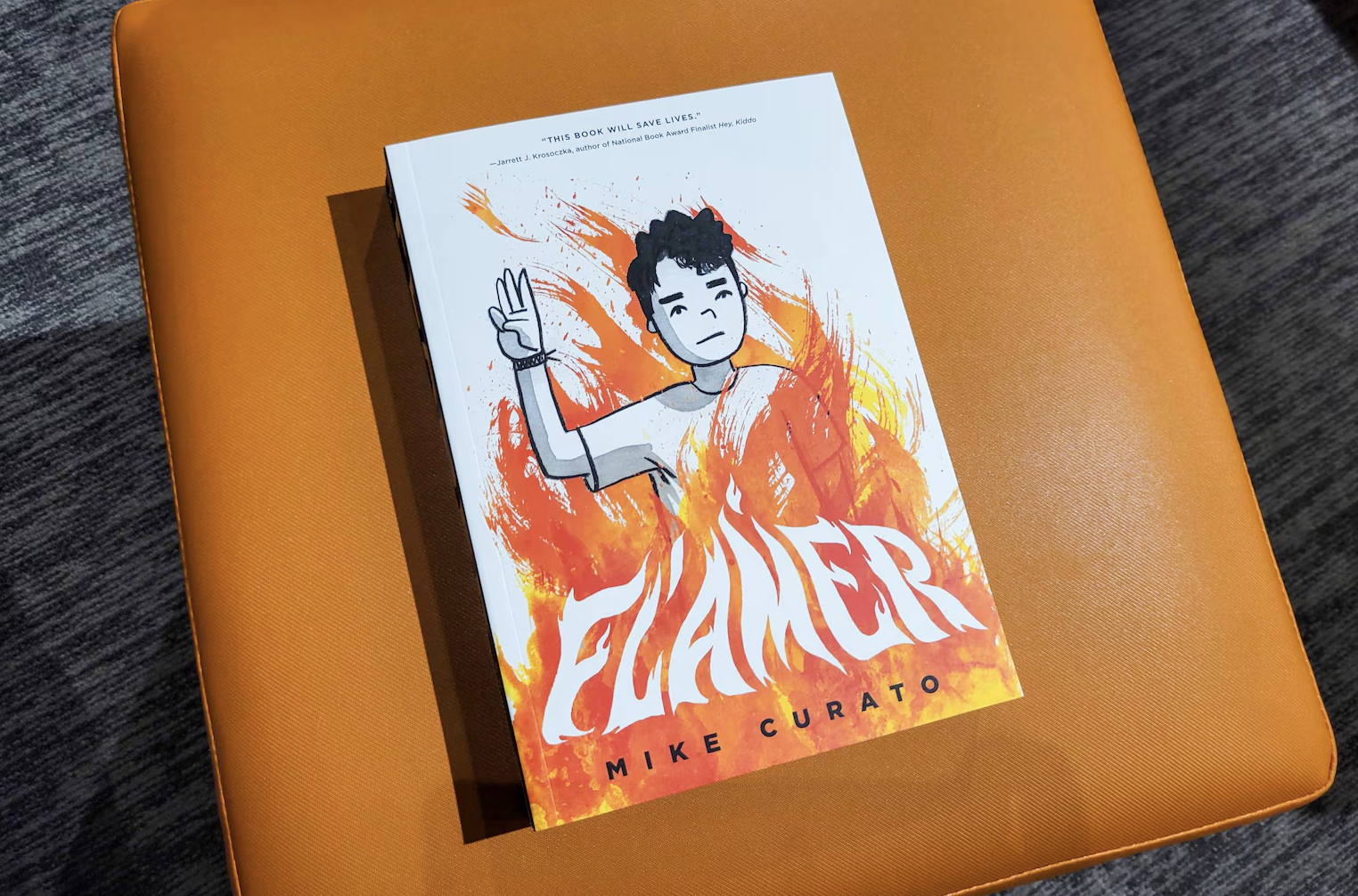
By KRISTEN GRIFFITH | Marking a historic moment in Maryland’s debate over school library censorship, Harford County’s school board voted Thursday to appeal the state’s unprecedented decision overturning its ban of a young adult graphic novel, pushing the dispute into circuit court.
The 5-2 vote followed a recent ruling from the state board overturning Harford’s ban of the book “Flamer.” In a special meeting Thursday afternoon, board members weighed whether to seek reconsideration or take the matter to circuit court — ultimately opting to appeal.
The book “Flamer” is by Mike Curato, who wrote about his experience being bullied as a kid for being gay.
The rest of this article can be found on the Baltimore Banner’s website.
Maryland
Salisbury, Md. rainbow crosswalk removed on Veterans Day
Mayor’s order denounced by LGBTQ activists as act of bigotry
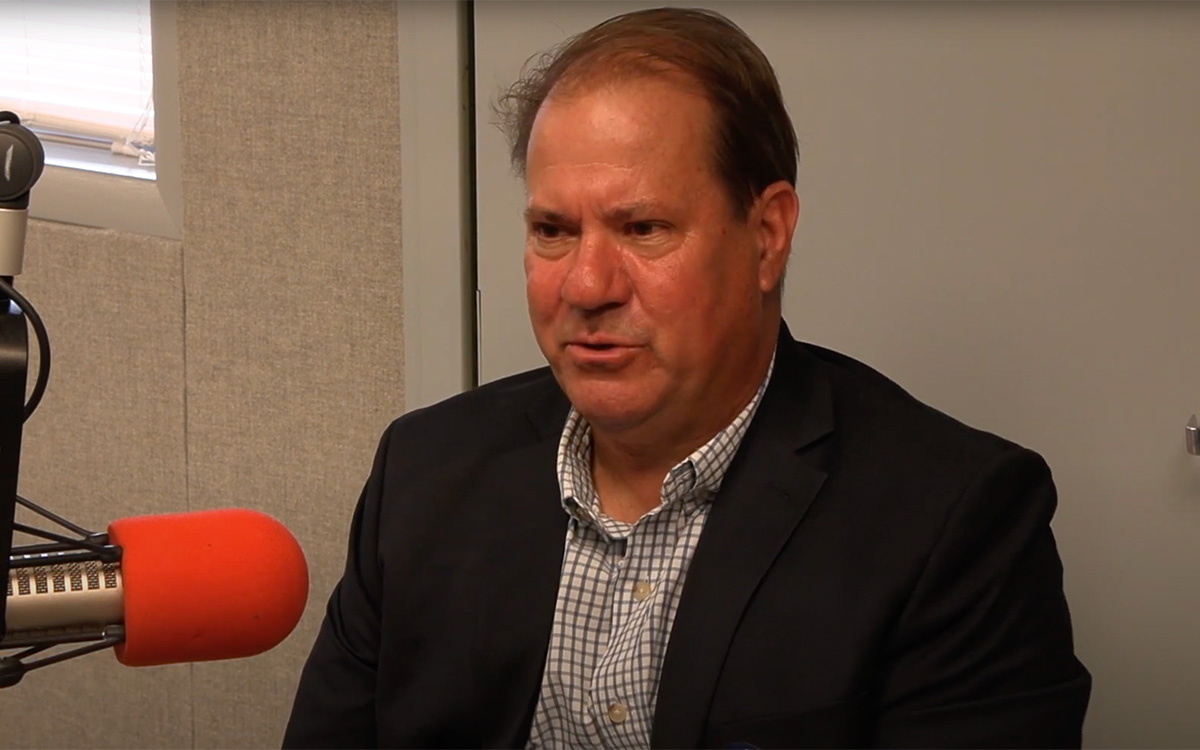
Under the directive of its mayor and over strong objections from LGBTQ rights advocates and their supporters, the city of Salisbury, Md. on Nov. 11 removed a rainbow crosswalk from a prominent intersection across from the mayor’s office and the city’s public library.
Salisbury LGBTQ rights advocate Mark DeLancey, who witnessed the crosswalk removal, said instead of painting over it as other cities have done in removing rainbow crosswalks, a powerful grinding machine was used to rip apart the asphalt pavement under the crosswalk in what he believes was an effort by the mayor to “make a point.”
Like officials in other locations that have removed rainbow crosswalks, Salisbury Mayor Randy Taylor said the crosswalk removal was required under U.S. Department of Transportation regulations put in place by the Trump administration that do not allow “political” messages on streets and roadways.
“Since taking office, I’ve been transparent about my concerns regarding the Pride crosswalks installed in Downtown Salisbury,” Taylor said in a statement. “While I have made every effort to respect the decisions of previous administrations and the folks that supported them, it has become clear that a course of correction – as planned – is necessary to align with current Department of Transportation standards for roadway markings,” he said in his Nov. 7 statement that was posted on the city’s Facebook page.
DeLancey is among the activists and local public officials in many cities and states that dispute that the federal Department of Transportation has legal authority to ban the Pride crosswalks. D.C. and the Northern Virginia jurisdictions of Arlington and Alexandria are among the localities that have refused to remove rainbow crosswalks from their streets.
“He decided to take this on himself,” DeLancey said of Taylor’s action. “It’s not a law. It’s not a ruling of any kind. He just said that was something that should happen.”
DeLancey points out that Salisbury became the first jurisdiction in Maryland to install a rainbow crosswalk on a public street in September 2018.
“This is another blatant attempt by our Republican mayor to remove any references to groups that don’t fit with his agenda,” Salisbury LGBTQ advocate Megan Pomeroy told the local publication Watershed Observer. “The rainbow crosswalk represents acceptance for everyone. It tells them, ‘You matter. You are valued. You are welcome here,’” she was quoted as saying.
The publication Delmarva Now reports that a longtime Salisbury straight ally to the LGBTQ community named K.T. Tuminello staged a one-person protest on Nov. 10 by sitting on the sidewalk next to the rainbow crosswalk holding a sign opposing its removal.
“Tuminello said Nov. 10 he had been at the embattled crosswalk since 12 a.m. that morning, and only three things could make him leave: ‘I get arrested, I have to get into an ambulance because of my medical difficulties, or Randy Taylor says you can keep that one rainbow crosswalk,’” the Delaware Now article states.
DeLancey said he has known Tuminello for many years as an LGBTQ ally and saw him on the night he staged his sit-in at the site of the crosswalk.
“I actually went to him last night trying to give him some water,” DeLancey told the Washington Blade. “He was on a hunger strike as well. He was there for a total of 40 hours on strike, not eating, no sleeping in the freezing cold”
Added DeLancey, “He has been supporting our community for decades. And he is a very strong ally, and we love his contribution very much.”
Political observers have pointed out that Salisbury for many years has been a progressive small city surrounded by some of Maryland’s more conservative areas with mostly progressive elected officials.
They point out that Taylor, a Trump supporter, won election as mayor in November 2023 with 36.6 percent of the vote. Two progressive candidates split the vote among themselves, receiving a combined total of 70.8 percent of the vote.
-

 U.S. Supreme Court4 days ago
U.S. Supreme Court4 days agoSupreme Court rejects Kim Davis’s effort to overturn landmark marriage ruling
-

 District of Columbia4 days ago
District of Columbia4 days agoCapital Pride files anti-stalking complaint against local LGBTQ activist
-

 Politics1 day ago
Politics1 day agoPro-trans candidates triumph despite millions in transphobic ads
-

 Dining4 days ago
Dining4 days agoSpark Social House to start serving alcohol





